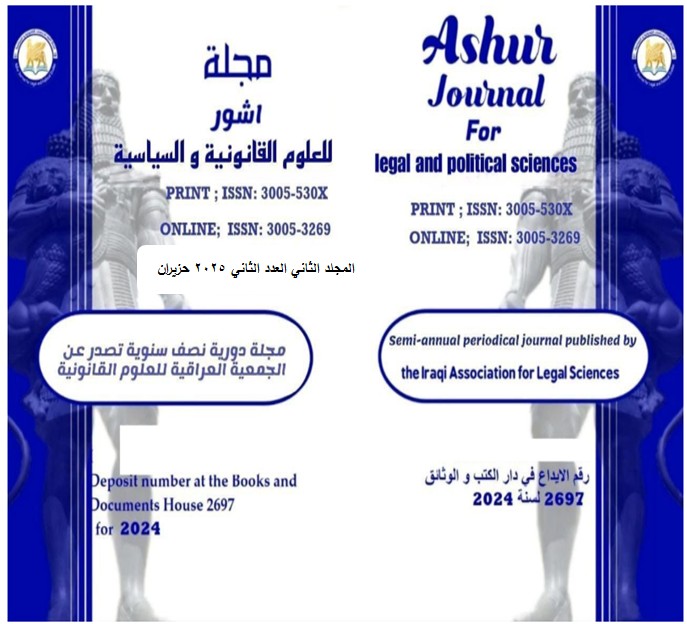Balancing the Power of Authority and Democratic Values (An Analytical Constitutional Study)
DOI:
https://doi.org/10.64184/ajlps.V2.I2.Y2025.P382-407.54Keywords:
authority, power, democracy, law, people.Abstract
The power of authority represents the unified material ability to impose obedience independently towards everyone and on the basis of the law. Power does not always mean the control or domination. The power of authority finds its intellectual basis in many concepts, including the satisfaction of the general ideas of individuals, and unity and continuity of the state. The strength of authority is affected by many democratic values as the factor of beliefs in order to unify the values that are considered the essence of the right or the law as well as that The political authority must be civilian, not military. Force is affected by the effectiveness of the law when it sets conditions that prevent the use of force easily and are characterized by clarity and generality. Power is affected by the process of distributing Authority in the federal state, which requires the federal control over the regional forces while at the same time ensuring the federal participation. However, The Iraqi Constitution in force for the year 2005 weakened the strength of the federal authority due to the weak relationship between the provincial guards and the federal authority, even in emergency circumstances. He did not establish a specific method for implementing federal laws and decisions. The legislator also exaggerated in taking into account the representation of components in the armed forces. The constitution also weakened from the law when it allowed the authority to restrict rights and freedoms based on the law.
References
First: Books
1. André Hauriot, Constitutional Law and Political Institutions, Vol. 1, Dar Al-Ahliya, Beirut, 1974.
2. Austin Rennie, The Politics of Government, Vol. 2, translated by Dr. Hassan Ali Al-Dhanoun, Franklin Printing and Publishing House, Baghdad, 1966.
3. Dr. Ibrahim Abdel Aziz Shiha, Political Systems (States and Governments), Mansha'at Al-Maaref, Alexandria, 2006.
4. Ahmed Tawfiq, The Science of the State, Vol. 1: On the Origins of the State and the Origins of its Idea, Al-Nahda Press, Cairo, 1934.
5. Dr. Tharwat Badawi, Political Systems, Dar Al-Nahda Al-Arabiya, Cairo, 1989.
6. John Stuart Mill, Parliamentary Governments, Dar Al-Yaqza Al-Arabiya for Authorship, Translation, and Publishing, translated by Emile Al-Ghouri, Syria, n.d.
7. John Locke, Civil Government and Its Relationship to Jean-Jacques Rousseau's Social Contract Theory, translated by Mahmoud Shawqi Al-Kayyal, National House for Printing and Publishing, Cairo, n.d.
8. Jean-Jacques Rousseau, The Social Contract, translated by Adel Zaiter, Hindawi Foundation for Education and Culture, Cairo, 2013.
9. Dr. Hussein Abdel Hamid Ahmed Rashwan, On Power, Authority, and Influence (A Study in Political Sociology), Alexandria Book Center, 2007.
10. Hussein Jamil, Martial Law, Al-Ani Press, Baghdad, 1953.
11. Robert MacIver, The Formation of the State, translated by Dr. Hassan Saab, Dar Al-Ilm Lil-Malayin, T.O., Syria, pp. 107-108.
12. Dr. Ragheb Jibril Khamis Ragheb Sakran, The Conflict between Individual Freedom and State Authority, 2nd ed., Modern University Office, Cairo, 2011.
13. Dr. Abdullah Laroui, The Concept of the State, Arab Cultural Center, Rabat, 2011.
14. Dr. Ta'ima Al-Jarf, Theory of the State and the General Principles of Political Systems and Systems of Government: A Comparative Study, Modern Cairo Library, 1973.
15. Dr. Kamal Al-Ghali, Principles of Constitutional Law and Political Systems, Dar Al-Uruba, Damascus, 1977-1978.
16. Dr. Muhammad Kamil Laila, Political Systems (State and Government), Dar Al-Nahda Al-Arabiya, Beirut, 1969.
17. Dr. Munther Al-Shawi, Constitutional Law, Vol. 1, Theory of the State, 2nd ed., Al-Atik Book House, Cairo, 2007.
18. Muhammad Sa'id Taleb, The Modern State and the Search for Identity, 1st ed., Dar Al-Shorouk; Amman, 1999.
19. Dr. Muhammad Tay, Constitutional Law and Political Institutions, 6th ed., Zain Legal Publications, Beirut, 2009.
20. Maurice Duverger, Sociology of Politics, translated by Dr. Salim Haddad, 1st ed., University Foundation for Studies and Publishing, Egypt, 2001.
21. Dr. Nu'man al-Khatib, The Mediator in Political Systems and Constitutional Law, 1st ed.,
22. Dar al-Thaqafa for Publishing and Distribution, Jordan, 1999. Nasif Nassar, The Logic of Authority (An Introduction to the Philosophy of Command), 1st ed., Dar Amwaj, Beirut, 2001.
Second: University Theses
1. Hussein Lahouin Abdul, The Extent of Balance between the Powers and Responsibilities of the President of the State in Iraqi Constitutions: A Comparative Study, Master's Thesis, College of Law, University of Baghdad, 2012.
2. Sankar Mushir Ahmed, The Problem of Political Authority in Liberal Philosophy (John Stuart Mill as a Model), Master's Thesis, College of Law and Politics, University of Salahaddin-Erbil, 2008.
3. Dr. Muhammad Izzat Fadhil, The Effectiveness of the Federal Government in Light of the Balance of Powers, Dar Al-Sanhouri, Beirut, 2016.
Third: Laws
1. The Iraqi Constitution of 2005.
2. National Security Defense Order No. 1 of 2004.
3. Labor Law No. 37 of 2015.
Downloads
Published
Issue
Section
License
The authors retain Full copyright of their published article
Ashur Journal of Legal and Political Sciences applies the Creative Commons Attribution 4.0 International (CC BY 4.0) License to articles and other works we publish. If you submit your paper for publication by AJLPS, you agree to have the CC BY 4.0 license applied to your work.
Articles can be read and shared for under the following conditions:
BY: Attribution must be given to the original source (Attribution)
Full details available at
https://creativecommons.org/licenses/by/4.0/






